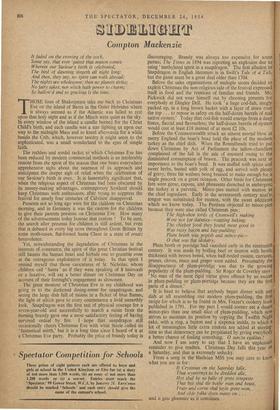Compton Mackenzie
It faded on the crowing of the cock, Some say, that ever 'gainst that season comes Wherein our Saviour's birth is celebrated, The bird of dawning singeth all night long: And then, they say, no spirit can walk abroad; The nights are wholesome; then no planets strike; No fairy takes, nor witch hath power to charm; So hallow'd and so gracious is the time. THOSE lines of Shakespeare take me back to Christmas Eve on the island of Barra in the Outer Hebrides where it always seemed as if the Atlantic was lulled to rest upon that holy night and as if the Minch were quiet as the sky. In every window of the island a candle burned for the Christ Child's birth, and each candle was a star lighting us upon our way to the midnight Mass and to kneel afterwards for a while beside the Crib, which, however tawdry it might seem to the sophisticated, was a small wonderland to the eyes of simple faith.
The ruthless and sordid racket to which Christmas Eve has been reduced by modern commercial methods is so intolerably remote from the spirit of the season that one hears everywhere apprehensive sighs about the nearness of its approach and anticipates the deeper sigh of relief when the celebration of our Saviour's birth is over. It is lamentably significant that, when the religious aspect of Christmas had been obscured by its money-making advantages, contemporary Scotland should keep Christmas with enthusiasm, after trying to suppress the festival for nearly four centuries of Calvinist disapproval.
Presents not so long ago were for the children on Christmas morning, and in Germany it was the custom for the children to give their parents presents on Christmas Eve. How many of the advertisements today honour that custom ? To be sure, the search after presents for children is still ardent, but even that is debased in every big store throughout Great Britain by some moth-eaten, flat-footed Santa Claus in a state of ersatz benevolence.
Yet, notwithstanding the degradation of Christmas in the interests of commerce, the spirit of this great Christian festival still haunts the human heart and forbids one to grumble even at the outrageous exploitation of it today. In that spirit I remind myself that those caricatures of St. Nicholas, whom children call ' Santa' as if they were speaking of d hairwash or a laxative, will cat a better dinner on Christmas Day on account of their fortnight's engagement as showmen.
The great moment of Christmas Eve in my childhood was going in to the darkened dining-room for snapdragon, and seeing the large dish full of raisins in a flicker of blue flames, the light of which gave to every countenance a livid unearthly look. Snapdragon was the first test of physical courage for a seven-year-old and successfully to snatch a raisin from the burning brandy gave one a most satisfactory feeling of having survived ordeal by fire. I hope that snapdragon , still occasionally cheers Christmas Eve with what Steele called its ' fantastical mirth,' but it is a long time since I heard of it at a Christmas Eve party. Probably the price of brandy today is discouraging. Brandy was always too expensive for some purses; The Times in 1894 was reporting an explosion due to using ' methylated spirit in a snapdragon.' The first allusion to Snapdragon in English literature is in Swift's Tale of a Tub, but the game must be a great deal older than 1704.
Before the sales organisations of multiple stores decided to exploit Christmas the non-religious side of the festival expressed itself in food and the reunions of families and friends. Mr. Pickwick did not wear himself out by choosing presents for everybody at Dingley Dell. He took ' a huge cod-fish, snugly packed up, in a long brown basket with a layer of straw over the top ... to repose in safety on the half-dozen barrels of real native oysters.' Today that cod-fish would emerge from a deep freeze, flaccid and flavourless; the half-dozen barrels of oysters would cost at least £18 instead of at most £2 10s.
Before the Commonwealth struck an almost mortal blow at merry England the boar's head held the place of the modern turkey as the chief dish. When the Roundheads tried to put down Christmas by Act of Parliament the tallow-chandlers complained of the fall in the sale of mustard owing to the diminished consumption of brawn. The peacock was next in importance to the boar's head. It was stuffed with spices and sweet herbs, basted with yolk of egg, and served with plenty of gravy, three fat wethers being bruised to make enough for a single peacock on a great occasion. Other birds for Christmas fare were geese, capons, and pheasants drenched in ambergris; the turkey is a parvenu. Mince-pies started with mutton as the chief ingredient. Early in the seventeenth century neat's. tongue was substituted for mutton, with the sweet additions which we know today. The Puritans objected to mince-pies because they were also called ChristmaS pies: The high-shoe lords of Cromwell's making Were not for dainties—roasting baking; The chiefest food they found most good in Was rusty bacon and bag-pudding; Plum broth was popish and mince-pie- ° that was flat idolatry.
Plum broth or porridge had vanished early in the nineteenth century. It was made by boiling beef or mutton with broth, thickened with brown bread, when half-boiled raisins, currants, prunes, cloves, mace and ginger were added. Presumably the disappearance of plum-porridge was due to the growing popularity of the plum-pudding. Sir Roger de Coverley says ' No man of the most rigid virtue gives offence by an excess in plum-pudding or plum-porridge because they are the first parts of a dinner.'


























 Previous page
Previous page